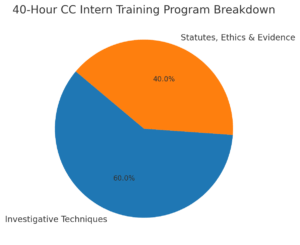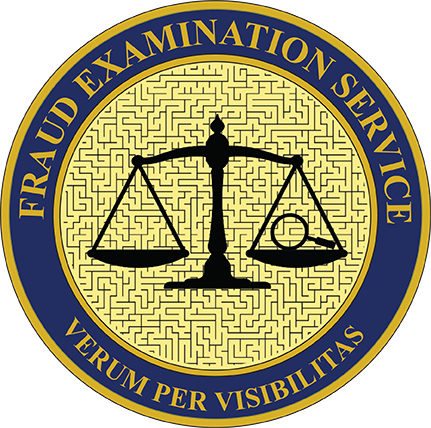Florida regulates private‐investigation activities to ensure professionalism, accountability, and public safety. Two key components of this framework are contract‐basis investigative services under Section 493.6203(6)(a) & (b), Florida Statutes, and the mandatory 40-hour training program for CC interns who will serve under “A”-licensed private-investigation agencies. This article offers a comprehensive, 1,500-word overview—structured with clear headings and subheadings—so you can confidently present it to clients, stakeholders, or regulatory reviewers.
Contract-Basis Private Investigation Services
Under Florida Statutes Section 493.6203(6)(a) & (b), licensed agencies may contract with clients—law firms, corporations, or private individuals—to perform discrete investigative tasks. These engagements must be governed by a written contract, executed by authorized agency representatives, and carried out exclusively by properly credentialed personnel.
Statutory Foundations
Florida law defines contract investigations as services performed under formal agreements that specify scope, deliverables, fees, and confidentiality provisions. By operating under a Class MA agency license with duly appointed Class MB management, firms demonstrate compliance with Chapters 493.6101 and 493.6203, ensuring all contract work is lawful, ethical, and defensible. You can review the full text of the statute here: Florida Statutes §493.6203.
Engagement Agreement Essentials
A robust contract-basis engagement includes the following elements:
- Scope of Work: Clearly defined tasks—surveillance, background checks, document retrieval, or on-site inspections.
- Personnel Qualifications: Only Class C investigators or higher may conduct fieldwork; interns (Class CC) assist under direct supervision.
- Timeline & Milestones: Phased deliverables with target dates for interim reports, evidence submission, and final analysis.
- Confidentiality & Data Handling: Explicit protocols for data encryption, secure storage, and destruction of sensitive materials upon project completion.
- Fees & Expenses: Transparent fee structures—hourly rates, flat fees, or retainer holds—and reimbursement policies for travel or specialized services.
Core Contract Services
Licensed agencies typically provide:
- Evidence Gathering: Physical surveillance, covert photography, and witness interviews.
- Public-Records Research: Retrieval of court filings, property deeds, corporate registrations, and regulatory filings under Florida’s Sunshine Law.
- Digital Forensics Assistance: Coordination with forensic specialists to image devices, extract metadata, and preserve electronic evidence.
- Field Investigations: Site security assessments, product-loss inspections, and controlled-access observations.
- Report Compilation: Preparation of detailed, timestamped reports with annotated exhibits suitable for internal review or litigation support.
Compliance & Quality Control
To maintain statutory compliance and ensure admissibility in court, agencies must enforce:
- Chain-of-Custody Protocols: Every item of evidence—USB drives, printed documents, or digital files—receives a unique identifier, logged transfers, and tamper-evident packaging.
- Supervisor Oversight: Class MB managers review all field reports, verify investigator credentials, and confirm that methods adhered to legal and ethical guidelines.
- Ongoing Audit Trails: Periodic internal audits examine case files, engagement contracts, and investigator logs to catch deviations early and reinforce best practices.
40-Hour CC Intern Training Program
Before a candidate can legally work as a Class CC intern, Florida requires them to complete a 40-hour training program approved by the Department of Agriculture & Consumer Services. This foundational coursework arms interns with the knowledge and skills necessary to support investigative operations under licensed oversight.

Training Objectives
The 40-hour curriculum is designed to:
- Introduce statutory requirements governing private investigations.
- Instill ethical standards and confidentiality obligations.
- Teach practical field techniques—surveillance, interviewing, and documentation.
- Build awareness of evidence-handling and report-writing protocols.
Curriculum Breakdown
Approved providers (community colleges, universities, or accredited training schools) deliver the program in two main modules:
- Investigative Techniques (24 hours)
- Surveillance Fundamentals: Stakeout planning, mobile tracking, and situational awareness.
- Interview Strategies: Question-framing, consent protocols, and note-taking best practices.
- Report Writing: Structured narrative formats, exhibit annotation, and clear summarization of findings.
- Legal Boundaries: Avoiding trespass, harassment, and other prohibited behaviors.
- Statutes, Ethics & Evidence (16 hours)
- Chapter 493 Overview: License classifications, scope of authority, prohibited acts, and disciplinary processes.
- Evidence Law & Chain of Custody: Admissibility criteria, proper labeling, and secure storage requirements.
- Confidentiality & Privacy: Handling personal data, complying with HIPAA (when relevant), and safeguarding client-sensitive materials.
- Professional Ethics: Conflict-of-interest avoidance, impartiality, and non-advocacy stance in reporting.
Delivery & Assessment
Training can be delivered via:
- In-Person Classrooms: Interactive lectures, role-play scenarios, and group exercises.
- Live Virtual Sessions: Real-time instruction with breakout rooms for simulated investigations.
- Home-Study Programs: Online modules paired with proctored examinations to verify identity and comprehension.
Each intern must pass a written exam (minimum 70% score) and complete practical assessments—such as drafting a mock report or conducting a supervised interview—to receive their Certificate of Completion.
Transition to Internship
After certification, CC interns embark on a supervised internship under a Class C or MA-licensed investigator. During this phase, interns:
- Apply Theoretical Knowledge: Conduct limited surveillance tasks, observe formal witness interviews, and assist in evidence cataloging.
- Shadow Senior Investigators: Learn advanced tactics, tools, and report-finalization workflows.
- Document Progress: Maintain daily logs of activities, challenges encountered, and lessons learned—forming part of their eligibility dossier for full licensure.
Internships typically span 6–12 months, culminating in a combined portfolio of training hours and field experience sufficient to qualify for a Class C license application.
Integrating Contract Services with Intern Training
Strategically combining contract engagements with CC-intern training enhances both service delivery and workforce development.
Controlled Exposure
- Tiered Responsibilities: Assign interns low-risk tasks first (e.g., document retrieval, mundane field observations) before entrusting them with sensitive surveillance roles.
- Supervisor Feedback Loops: Senior investigators provide real-time coaching, corrective guidance, and performance appraisals, ensuring interns internalize statutory and ethical standards.
Quality Assurance
- Parallel Reporting Reviews: Each report drafted by an intern undergoes dual review—initial screening by a Class C investigator followed by final approval from the Class MB manager.
- Performance Metrics: Track intern accuracy (report-error rates), timeliness (deadline adherence), and professionalism (client feedback) to fine-tune future training and recruitment.
Business Continuity
By nurturing a pipeline of well-trained CC interns, agencies ensure:
- Scalable Staffing: Rapid allocation of field personnel to high-volume contract cases.
- Institutional Knowledge Retention: Interns absorb proprietary methodologies and client-specific protocols from day one.
- Enhanced Reputation: Demonstrating a formal training program underscores an agency’s commitment to excellence and compliance—an important differentiator in competitive markets.
Ethical Safeguards & Compliance Monitoring
Maintaining public trust and avoiding legal pitfalls requires constant vigilance.
Statutory Adherence
All contract engagements and intern activities must align with:
- Chapter 493: Scope definitions, prohibited actions, and license‐maintenance rules.
- Sunshine Law & Privacy Statutes: Proper handling of public-record requests and personal data.
Data Protection
- Encryption: Digital case files stored in encrypted databases with multi-factor authentication.
- Physical Security: Secure, access-controlled rooms for sensitive documents and evidence.
- Retention Policies: Defined timelines for evidence disposal or client-approved archival.
Ongoing Audits & Reviews
- Internal Audits: Quarterly reviews of contract files, intern logs, and engagement agreements to detect compliance gaps.
- Third-Party Assessments: Optional accreditation through bodies like ASIS International to benchmark practices against global standards.
Conclusion & Next Steps
Florida’s combination of contract‐basis investigative services and a structured CC-intern training program under Sections 493.6203(6)(a)&(b) and 493.6203 ensures that agencies deliver reliable, lawful, and high‐quality services. By upholding rigorous engagement standards, investing in comprehensive intern education, and embedding ethical safeguards, firms can meet client needs while navigating a complex regulatory landscape.
For more information on contracting with us or enrolling interns in our certified training program, visit our Services page or call 01 (727) 470-0960. We’re committed to protecting your interests and upholding the highest professional standards.
FAQs: Private Investigative Services & CC Intern Training Under Florida Law
What are contract-basis private investigation services under Section 493.6203(6)(a) & (b)?
These services allow licensed Class MA agencies to enter written agreements with clients—law firms, corporations, or individuals—to perform discrete investigative tasks, provided all work is done by credentialed personnel under a formal contract.
Who is eligible to perform contract investigations?
Only agencies holding a Class MA license, with a designated Class MB manager, and investigators with Class C credentials may conduct contract investigations. Class CC interns may assist but must be under direct supervision at all times.
What key elements must a contract-basis engagement agreement include?
Agreements must clearly define the scope of work (surveillance, background checks, etc.), personnel qualifications, timelines and milestones, confidentiality/data-handling protocols, and fee structures with expense reimbursement policies.
Which core investigative services do contract-basis agencies typically provide?
Agencies commonly offer physical evidence gathering (surveillance, covert photography), public-records research, digital-forensics assistance, field security assessments, product-loss inspections, and detailed report compilation.
How do agencies ensure statutory compliance and quality control?
They enforce strict chain-of-custody protocols; require Class MB manager review of all field reports; and conduct ongoing internal audits of case files, engagement contracts, and investigator logs to catch and correct any deviations.
What topics are covered in the 40-hour CC intern training program?
The curriculum splits into two modules: Investigative Techniques (surveillance fundamentals, interview strategies, report writing, legal boundaries) and Statutes, Ethics & Evidence (Chapter 493 overview, chain-of-custody law, confidentiality, professional ethics).
How is intern competency assessed during training?
Interns must pass a written exam with at least 70%, complete practical exercises (mock reports, supervised interviews), and demonstrate understanding of statutory limits and ethical standards before certification.
How do CC interns transition from training into fieldwork?
After certification, interns embark on a supervised internship—usually 6–12 months—where they apply learned techniques on low-risk tasks, shadow senior investigators, and document daily logs to build their licensure portfolio.
How can agencies integrate contract services with intern training?
By assigning interns tiered responsibilities (starting with document retrieval), providing real-time supervisor feedback, and using parallel reporting reviews, agencies boost service capacity while maintaining high quality.
Which ethical safeguards govern both contract work and intern activities?
All activities must align with Chapters 493.6101 and 493.6203, adhere to public-records and privacy laws, employ encrypted/confidential data handling, and undergo regular internal and third-party audits to uphold neutrality and legal defensibility.

